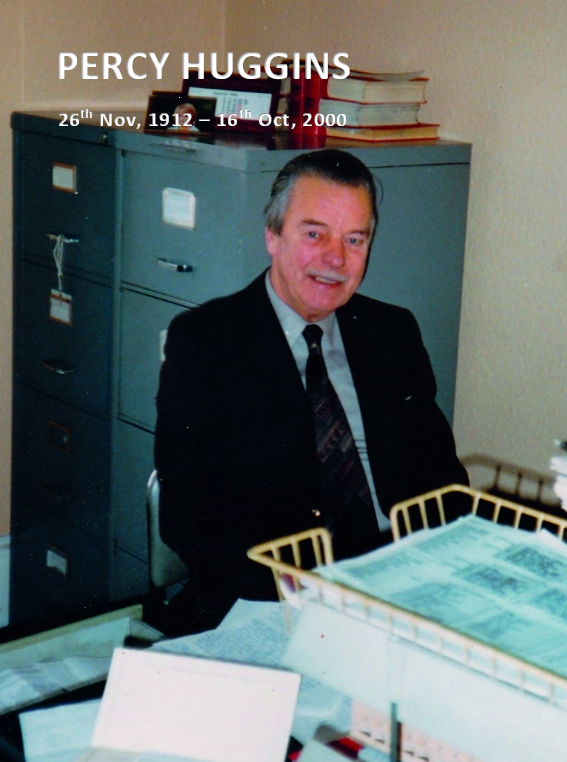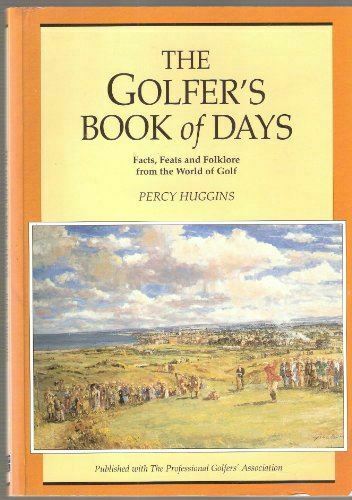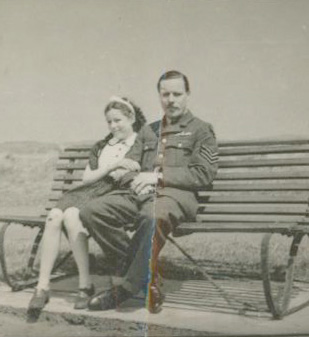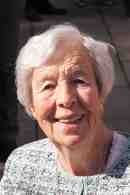
(Photo – Thank You to Mike Harris/Golf Monthly)
PERCY HUGGINS died aged 87 on 16th October, 2000 and was the voice of radio golf commentary in Scotland for a quarter of a century, and from 1957 to 1981 editor of Britain’s best-selling golf magazine, Golf Monthly.
Percy was one of the founding members of the Association of Golf Writers in 1938. He was Chairman from 1960 to 1978 and was Presidents of the Association from 1978 to 1981.
In 1990, Percy was honoured by the Memorial tournament for his services to journalism.
As Golf Monthly editor, Huggins always gave the impression that the reader he had in mind was a mirror image of himself, an inveterate theorist in permanent quest of the one secret which stood between him and golfing brilliance. In what was a crowded office, he could be found swinging a club in accordance with the latest technical doctrine. Quality instruction, he believed, was the basis of any successful golf magazine.
Huggins believed devoutly in the causes his magazine espoused. Much though he admired Henry Cotton’s masterly striking of the ball, he argued vehemently that the emphasis Cotton placed on well-trained hands was out of date and holding back golf in Britain compared to the game in America.

One of his great successes as editor was the following he built up for the mysterious “Mr X”, an amateur who had not taken up golf until he was past 50 but had taught himself so well that he quickly left behind many who had been playing since boyhood. “Mr X” popularised such notions as the contrasting “K” and “Y” address positions, all illustrated by strikingly simple line drawings. Whether it was actually true that he had got down to scratch no one seemed to know, but such was his impact that a later editor of the journal even fielded an offer for “Mr X” from Playboy magazine.
Percy Alexander Huggins was born in Clapham, south London, on November 26 1912. His parents were English, but his father, a scientific instrument maker then working in Glasgow, sent Percy’s mother back to London for the birth. Huggins, though, grew up in Glasgow, had a broad Scots brogue and always thought of himself as Scottish. He was educated at Hyndland School, in the Partick district of the city, and captained the cricket XI. His first job was as a tea merchant’s clerk in London but by 1935 he had returned to Glasgow as golf correspondent of the Evening Times, for whom he also wrote on rugby.
When war came he volunteered for the RAF, convinced that a mathematical bent would help with his ambition to become a navigator. But in the interview, his mind went blank and he made a nonsense of the questions. Fortunately, the officer in charge, a keen golfer, was delighted to discover that Huggins had covered the 1936 Open championship at Hoylake, which had been won by Alf Padgham, the professional at the officer’s own club. He unhesitatingly recommended Huggins for training as a pilot.
Huggins went on to fly more than 70 missions with 104 Squadron, equipped with Wellington bombers. Among these was a daring daylight bombing raid in 1941 on Brest Harbour in which three German warships were put out of action. Huggins was awarded the DFC. The citation paid tribute to his “great skill and initiative.”
Once, when the leading aircraft of his formation was hit by anti-aircraft fire, causing it to lose speed, Huggins stayed with the damaged aeroplane and prevented enemy fighters from finishing it off, although anti-aircraft shells were exploding all around. In another action, he had led four Wellingtons in an attack on four merchant ships and two destroyers in the Mediterranean, destroying one merchant ship and damaging two others.
Later on in the war, Huggins was posted to 220 Squadron in the Azores. From there he flew Fortress and Liberator aircraft on anti-submarine patrols, until the squadron’s duties were altered to transporting troops to India. He ended the war as a squadron leader and returned to journalism.
He became a commentator on golf for BBC Radio in Scotland and editor of Golf World Scotland. In 1951, at Pinehurst, he became the first golf writer based in Scotland to cover the Ryder Cup in America. He was also editor of the Golfer’s Handbook, making it the game’s essential work of reference for British golf lovers. He was a founder member of the Association of Golf Writers, of which he became chairman and president. In 1990, his contribution to the game was recognised by the Memorial Golf Journalism Award. He married, in 1938, Julia Barr. They had a daughter.
- Thank you to The Telegraph.
The following copied from:- https://dianacranstoun.com/tag/percy-huggins/
If you’re wondering why I’ve used archived copies of The Glasgow Herald as my go-to paper during the past month, it’s not just because I come from Glasgow, but my Uncle Alex, Anne’s big brother, used to be a journalist with the paper. An RAF pilot during the war, when he returned to Scotland he became the Voice of Scottish Golf, not just on the radio, but with The Glasgow Herald and then as the editor of Golf Monthly. When he died in 2000, both The Telegraph and The Glasgow Herald published obituaries.
Anne says: He started as a general reporter; he ‘covered’ the launching of the Queen Mary, I know, because he came home saying, ‘She did it!’ – but whether he was talking about Queen Mary successfully throwing the bottle of bubbly or the great ship successfully floating instead of sinking to the bottom, I don’t know, ships always being referred to as feminine. Then he started covering sport and eventually as you know became Scotland’s prime golf journalist. He was sent to the first post-war American (Open Golf/Ryder Cup?) and his boss told him proudly that he would be flying there (flying being a great rarity at the time). Alex of course was disgusted after his years and years as a bomber pilot DFC, so they let him travel one way on the QM. I remember a photo of him with some famous golfer (Henry somebody I think) which appeared in the paper and of which there was a print at home.

Another memory from Anne: After Alex had done many, many more than the stipulated number of bombing flights he was transferred to the Azores on anti-submarine patrol. Here there were bananas, and when he came home on leave (after VE Day), managed to bring us a few – Mother made sure their skins were put right on top of the rubbish bins so that when the lid was lifted the dustmen could wonder at them!
Having bombarded you with almost daily posts for the past month, I’m going to take a break for a few weeks and plan to return with my usual schedule on December 15th – although I may add the occasional post before then. Looking forward to catching up with you.


Recent Comments